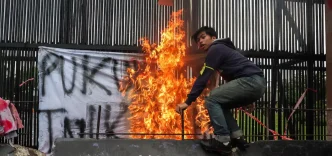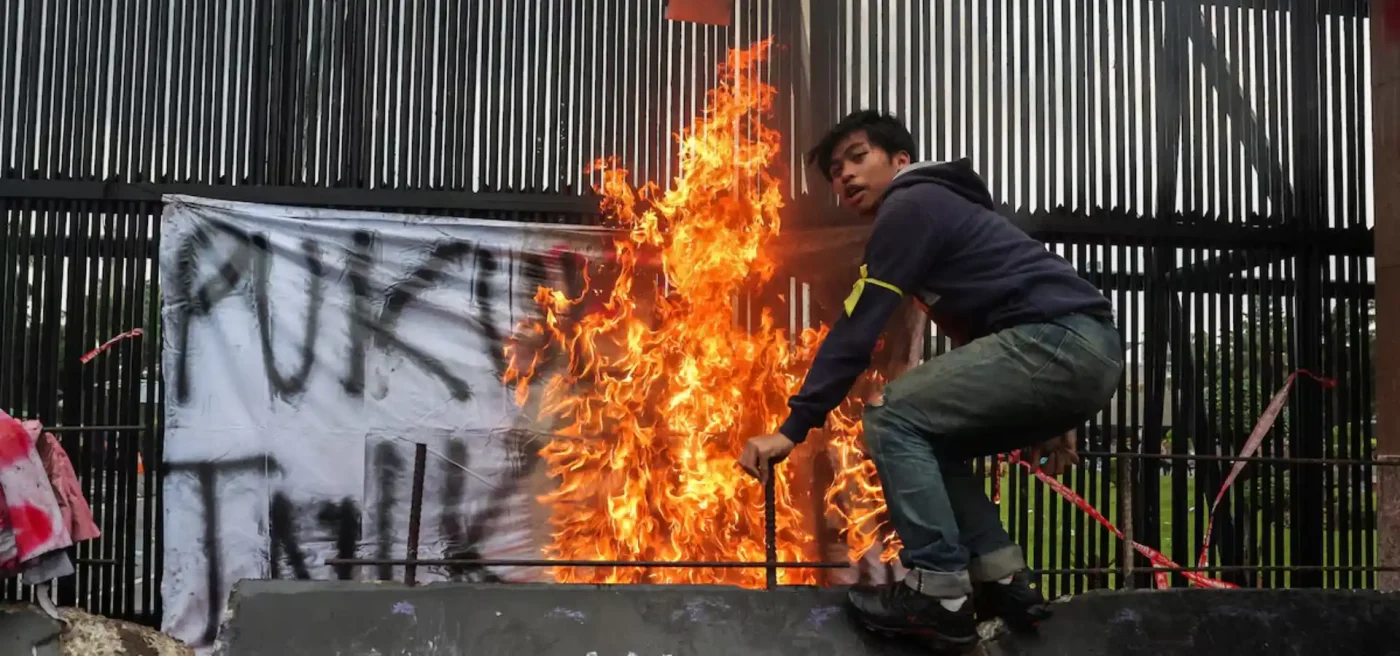Jakarta’s streets have become a battleground for democratic expression and state authority, as recent student protests against legislative changes and labor policies have met with forceful police responses. The May Day rally on May 1, 2025, in front of the House of Representatives building, alongside other demonstrations in Surabaya and beyond, has ignited fierce criticism over alleged police brutality and the criminalization of protesters, including medical volunteers. As universities, civil society groups, and rights organizations rally in defense of the students, questions are mounting about the balance between public order and civil liberties in Indonesia’s evolving democracy.
Violent Dispersals and Arrests at May Day Rally
On May 1, 2025, hundreds of students and activists gathered in Jakarta to protest labor policies during the annual May Day rally. What began as a peaceful demonstration turned chaotic around 4:45 p.m. when police deployed water cannons and barricades to disperse the crowd, according to a statement from the University of Indonesia’s Student Executive Body (BEM UI). Eyewitness accounts describe widespread panic as protesters fled, with some alleging they were dragged, choked, punched, kicked, and stomped on by officers.
Jakarta Police have since named 14 suspects in connection with the protest, including 10 demonstrators and four individuals serving as medical and paralegal volunteers. Among them is Cho Yong Gi, a philosophy student from the University of Indonesia (UI), who was reportedly acting as a medical volunteer, wearing identifiable attire and carrying first-aid equipment. Despite his humanitarian role, Yong Gi was allegedly subjected to physical violence before his arrest, sparking outrage from his university and peers.
“Arresting participants who were working in humanitarian roles, especially with the use of violence, raises serious concerns about civilian rights, including the protection of medical workers in peaceful demonstrations” said a statement from UI’s Department of Philosophy, released on June 4, 2025. The department has pledged full support to Yong Gi during the legal process and urged Jakarta Police to handle the case with fairness and objectivity.
Police Justification and Legal Framework
Jakarta Police spokesperson Sr. Comr. Ade Ary Syam defended the arrests during a press briefing on June 4, 2025, stating that the suspects violated orders to disperse after being instructed three times by authorities. “They are suspected of committing a criminal offense by disobeying orders of intentionally failing to leave after being ordered to do so three times by authorized authorities, as stipulated in Articles 216 and 218 of the Criminal Code [KUHP]” said Syam.
The police argue that the May 1 demonstration disrupted public order, necessitating intervention. However, critics contend that the response was disproportionate, particularly against individuals like Yong Gi, who were not engaging in violent or disruptive behavior. The inclusion of medical and paralegal volunteers among the suspects has further fueled accusations of overreach and abuse of power.
A Broader Pattern of Repression?
The Jakarta incident is not an isolated event. On May 21, 2025, 16 students from Trisakti University were named suspects following a violent clash during a protest commemorating Indonesia’s reform era. While police have not issued arrest warrants and expressed openness to a restorative justice approach, as reported by local media, the pattern of naming students as suspects has alarmed rights groups.
In Surabaya, on March 24, 2025, anti-riot police clashed with students protesting a revision to the armed forces law, with images showing officers shielding themselves as stones were thrown. These recurring confrontations have amplified concerns about the state’s approach to dissent, particularly among young activists and students who see themselves as guardians of Indonesia’s democratic gains.
Amnesty International Indonesia has condemned the arrests, describing them as reflective of excessive state force. “We have consistently called for accountability for this excessive use of force and urged authorities to ensure such incidents do not happen again” said Usman Hamid, the organization’s executive director, on June 5, 2025. His sentiments were echoed by Fadhil Alfathan, director of the Jakarta Legal Aid Institute (LBH Jakarta), who warned of the risk of unjust trials. “If this legal process continues as it is, we fear it will result in a flawed and unjust trial. Rather than upholding the rule of law, it risks punishing innocent people” said Alfathan.
Student Voices and University Support
The University of Indonesia, one of the country’s most prestigious academic institutions, has emerged as a vocal defender of its students. BEM UI reported that three of the 14 suspects from the May Day rally are UI students, and their statement painted a grim picture of the forced dispersal. “We strongly condemn and oppose all forms of repressive and arbitrary actions carried out by the police against fellow activists. This incident is not an isolated case, but rather part of a broader pattern of repression systematically perpetuated by the state” the student body declared.
This rhetoric underscores a growing frustration among Indonesia’s youth, many of whom view protests as a legitimate means of holding power to account. The reform era, which began in 1998 after the fall of Suharto’s authoritarian regime, remains a touchstone for student activism. Yet, as recent events suggest, the democratic space they fought for may be shrinking under the weight of state security measures.
Context of Indonesia’s Protest Culture
Indonesia has a storied history of student-led movements, dating back to the independence struggle and peaking during the 1998 protests that ousted Suharto. These movements have often been met with state resistance, but the post-reform era promised greater freedoms of expression and assembly. The recent wave of arrests and violent dispersals, however, raises questions about whether those promises are being fulfilled.
The protests in Jakarta and Surabaya are tied to broader grievances, including labor rights, military reforms, and perceived erosions of democratic norms. The May Day rally, for instance, was rooted in opposition to labor policies that activists argue undermine workers’ rights. Similarly, the Surabaya demonstration against revisions to the armed forces law reflects concerns about militarization and the potential rollback of civilian oversight.
For many students, these issues are not abstract policy debates but existential threats to the democratic ideals they hold dear. The heavy-handed police response, in turn, has only deepened their resolve, even as it places them at personal risk.
Legal and Ethical Dilemmas
The legal basis for the arrests—Articles 216 and 218 of the Criminal Code—centers on disobedience to authority. While these provisions aim to maintain public order, their application to peaceful protesters and humanitarian volunteers is contentious. Legal experts argue that such laws must be balanced against constitutional guarantees of free expression and assembly, enshrined in Indonesia’s 1945 Constitution as amended post-1998.
Moreover, the targeting of medical volunteers like Cho Yong Gi raises ethical questions about the protection of non-combatants in protest settings. International norms, including those outlined by the United Nations, emphasize the need to safeguard individuals providing humanitarian assistance, even in volatile situations. If confirmed, the allegations of violence against Yong Gi could constitute a violation of these principles, though no formal investigation into his treatment has been announced.
Public Sentiment and Political Implications
Public reaction to the protests and subsequent arrests has been mixed. On social media platforms like X, many Indonesians express solidarity with the students, decrying police tactics as reminiscent of the Suharto era. Others, however, argue that maintaining order is paramount, particularly in a country with a history of political instability.
Politically, the controversy could have far-reaching implications. Indonesia’s government, under President Prabowo Subianto as of late 2024, faces scrutiny over its handling of dissent. While Prabowo has pledged to strengthen democratic institutions, critics fear that security-centric policies may prioritize control over dialogue. The student protests, and the state’s response to them, could become a litmus test for his administration’s commitment to civil liberties.
Looking Ahead: A Call for Dialogue
As legal proceedings against the May Day suspects unfold, the spotlight remains on Jakarta Police and the broader state apparatus. Civil society organizations, including Amnesty International and LBH Jakarta, are pushing for independent investigations into the alleged use of excessive force. Meanwhile, universities like UI and Trisakti are mobilizing to protect their students, both legally and morally.
The stakes are high, not just for the individuals involved but for Indonesia’s democratic fabric. If the state continues to lean on force rather than engagement, it risks alienating a generation of activists who see themselves as stewards of reform. Conversely, if dialogue and accountability prevail, there may yet be a path to reconciling public order with the right to protest.
For now, the streets of Jakarta and Surabaya remain tense, a reminder of the fragile balance between authority and freedom. As students and activists regroup, and as the government weighs its next steps, one question looms large: can Indonesia honor its democratic aspirations without repeating the repressive patterns of its past?















